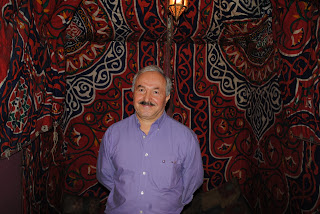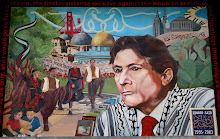
“Resistance is a must!” says Hussein Dawah. “If I grab your neck and choke you, will you not resist? Will you not fight back?”
Dawah, the owner of Ali Baba’s Cave, a Middle Eastern eatery on the corner of Valencia and 19th Streets in San Francisco’s Mission District, speaks passionately about the Palestinian cause.
Dawah came to the United States nearly 30 years ago, in 1980 to get his masters degree at UC Berkeley. He soon found it too expensive and was forced to drop out.
“There were many like me, in the same situation,” he said. “With our broken English it’s not really easy. We could not get good jobs we were qualified for, we started looking for the easiest thing to do.”
In San Francisco, where small businesses are prominent in areas like Th
e Mission, Palestinians own three out of five corner stores. They have become known in the community as simple business minded people with a strong work ethic.
After the British Mandate ended in Palestine in 1948, the United Nations Partition Plan for Palestine divided Palestine into two separate territories, one being declared as the state of Israel, and the other smaller portion of Gaza and the West Bank to become home for Palestinians.
Since then the area has been in a state of constant violence; the Zionists believe that the Jews have the right to the state of Israel, the Arabs believe that the Palestinians have the right to the land that was once theirs. The area designated for Palestinians has been deteriorating over the years and they have been forced to leave as refugees.
Thousands have been forced to flee their homeland in search of stable living environment. According to the United States Consensus there were over 72,000 Pales
tinians in America in the year 2000, that number rose nearly 50 percent since 1990.
“The Palestinian community immigrated to the US in three stages,” says Dawah. “1.) Those who came before the British Mandate made a strong base for the community 2.) Students came after the second war in the early 1950’s and 3.) After the 1967 war, a large number of students, like me, and well educated people fled here after losing everything in the war and not being able to return.”
Dawah never got to live in his homeland of Palestine. His family was forced out as refugees before he was born. He and his 11 brothers and sisters grew up in a one bedroom in Syria. His father always taught him that education is the key to resistance.
“It was a miserable life,” he said. “We lost our country, our culture, our resources, our wealth and belongings—the only thing we have is our education.”
Many of the Palestinians in San Francisco came here in the 1970s and 80s. They were a class of intellectuals that were in search of a better life. What they found was that they couldn’t continue on as they had in the Middle East.
Unable to get the jobs they were qualified for, they began open up small businesses like convenient stores and small eateries, while still trying to be active in the Palestinian cause.
“The Palestinian community was very politically active in the 1980’s,” says Dawah. “They are not as united now, but still, the roots of social activity exist but in a different form. There is a huge solidarity movement.”
When asked if he thinks Palestine will ever be recognized as a state again he securely says, “Wrongdoing can only succeed for a short time… for history, this is not a long time, this cannot last.”
“Palestinians tried for a long time to resist by means of education and solidarity,” Dawah says. “Sadly, this must be an armed struggle to get attention, this is the language that the world understands, and it is an armed struggle that forced the world to pay attention to us.”
Palestine, an area of only 10 square miles, relative to the size of the Bay Area, has been a topic of constant debate and attention across the globe over the years due to its strong resistance.
Many attempts have been placed on the idea of a two-state solution. This would mean that both Israel and Palestine would be to live peacefully, side by side, although there are great disputes over borders as well as who would claim Jerusalem.

Many Israeli’s and Palestinians, including Dawah, believe that a two-state solution is not the way to go. “A two-state solution logically would not work,” says Dawah. “We don’t want it, and they don’t want it. We need one voice and one leader, much like Nelson Mandela did in South Africa.”
“I am waiting to go back to Palestine, and live peacefully together.”


